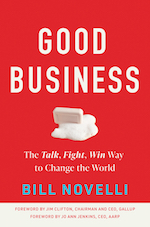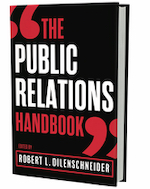 |
| Bill Novelli |
There’s probably no one more qualified to talk about how properly executed messaging can make a difference in the world than Bill Novelli.
When he and Jack Porter started up Porter Novelli, one of the first social marketing companies, in 1972, Novelli had basically made the switch from marketing products to promoting behavior and social policy. A veteran of Unilever, the Peace Corps and the November Group (the advertising arm of Richard Nixon’s re-election campaign), he had already set the template for the career that followed.
The story of that career is just one of the plot threads of Novelli’s “Good Business: The Talk, Fight, Win Way to Change the World.” By taking us through the many twists and turns of his professional life, Novelli also gives us an object lesson in how the rules of good marketing can be as easily applied to an anti-tobacco campaign or drive to improve health care as they can be to household products.
“I may have a PR background,” Novelli says, “but I think of my discipline as marketing and my career as social problem solving.”
“Doing good by doing well” stands as the central principle of “Good Business.” While making a positive contribution to society is job number-one for social marketing, Novelli never forgets the second word of that term. For him, the principles of persuasion, of maintaining relationships and creating value don’t lose their importance even when the profit motive is taken out of the equation.
 |
The social problems that Novelli has tackled over the course of that career are varied. At Porter Novelli, he spearheaded programs to address high blood pressure, fight cancer and promote infant health. He left the agency to become the chief operating officer (and eventually, CEO) of international relief agency CARE.
His resume also includes starting up the Campaign for Tobacco-Free Kids and leading the AARP. In both of those positions, he had to deal with probably the toughest audience any marketer can face: the U.S. Congress.
Novelli’s advice on how to negotiate a room full of professional politicians makes worthwhile reading for any communicator who has to deal with getting messages across to a diverse group of stakeholders. One of his primary recommendations is to always keep the lines of communication open.
But communicating does not always mean agreeing. A primary strategy that Novelli says he used during his years of trying to sell his ideas in Washington is to “talk and fight.”
"To solve big problems, we need everybody at the table: friends, near-friends, and opponents,” he says. “We need to talk as we search for possible agreements, but of course, in this highly competitive world, different companies, interests, and industries are going to fight it out as well. I’ve always found that the best strategy is to do both—to talk and fight.”
In the fight to help shore up the future of Social Security, which he worked on while at the AARP, Novelli had to use all of the tools and strategies in his marketing arsenal, and he clearly and entertainingly goes through them here. From boots-on-the-ground grassroots organizing to devising successful media strategies to helping colleagues work to the best of their potential, Novelli produces a playbook that is valuable for any communications pro.
The last chapters of the book go into how Novelli is passing on his knowledge to the next generation. He writes with obvious enthusiasm about the work he is doing with the Business for Impact center at Georgetown University’s McDonough School of Business.
And what he is selling to his students at Georgetown goes right to the heart of the whole idea of this book. He teaches them the value of social marketing and the principles that should be employed when practicing it.
Under the header “Advice to the Next Generation,” Novelli sets out what he says are the three overriding rules he’s learned over the course of his career: aim high and strive hard (“We can all be better and achieve far more than we think”); be ethical (“This sounds painfully obvious and commonplace. It is, but it’s also hard to do.”) and always balance personal responsibility with working for causes bigger than yourself.
At a time when social responsibility often seems like little more than the biggest catch-phrase of them all, Novelli gives the readers a guide to making it both an idealistic and a practical way to do business. “Good Business” shows how to make a career in communications, both a way of making a living and of making the world a better place.


 Time correspondent Simon Shuster’s “The Showman” demonstrates how Ukraine president Volodymyr Zelensky’s masterful knowledge of PR tactics and the power of propaganda transformed him from comedian into a respected world leader.
Time correspondent Simon Shuster’s “The Showman” demonstrates how Ukraine president Volodymyr Zelensky’s masterful knowledge of PR tactics and the power of propaganda transformed him from comedian into a respected world leader. Iuliia Mendel, who served as press secretary for Ukraine president Volodymyr Zelensky from 2019 to 2021, will release a book called “The Fight Of Our Lives” in September, published by Simon & Schuster’s One Signal Publishers.
Iuliia Mendel, who served as press secretary for Ukraine president Volodymyr Zelensky from 2019 to 2021, will release a book called “The Fight Of Our Lives” in September, published by Simon & Schuster’s One Signal Publishers. Robert Dilenschneider, former CEO of Hill and Knowlton, is releasing the fifth edition of The Public Relations Handbook on Feb. 15.
Robert Dilenschneider, former CEO of Hill and Knowlton, is releasing the fifth edition of The Public Relations Handbook on Feb. 15.  Big Advertising may be down for the count, but the power of marketing lives on. That’s the big takeaway from Paul Dyer’s “Friction Fatigue,” a look at what advertising’s downward spiral means for “future-focused brands."
Big Advertising may be down for the count, but the power of marketing lives on. That’s the big takeaway from Paul Dyer’s “Friction Fatigue,” a look at what advertising’s downward spiral means for “future-focused brands." Sabrina Horn, the high-tech PR guru who sold her Horn Group to Finn Partners in 2015, has published “Make It, Don’t Fake It.”
Sabrina Horn, the high-tech PR guru who sold her Horn Group to Finn Partners in 2015, has published “Make It, Don’t Fake It.”


 Have a comment? Send it to
Have a comment? Send it to 
No comments have been submitted for this story yet.